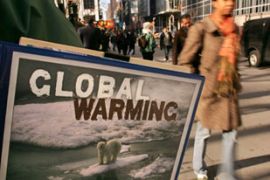US climate exhibit ‘toned down’
Smithsonian Institute accused of delaying exhibit on global warming.

The Smithsonian Institute, which runs 18 museums in the US capital, receives 70 per cent of its funds from the government – making it sensitive to official policies and guidelines.
The Smithsonian Institute issued a statement branding Sullivan’s allegations erroneous, saying that he was neither a scientist or directly involved with museum exhibits.
“We would never alter an exhibition on global climate change that would contradict our own knowledge and research, and that of other leading scientists around the world,” Cristian Samper, Smithsonian acting secretary said in the statement.
The exhibit at the National Museum of Natural History finally ran from April to November of 2006 and focused on climate change in the Arctic region as observed by scientists.
While many scientists agree the ominous rise in global temperatures is caused by human activity, in particular greenhouse gas emissions,
The Bush administration has rejected the research, which raises the prospect of the costly decision of curbing emissions.
Sullivan said the Arctic exhibit was canceled just before it was due to open and the project was put on hold for six months as museum officials altered its content.
“We were looking for scientific uncertainty of the data that is to make it appear more uncertain.
“You would have a statement about a model predicting global warming over time and you would add a label saying this model could be interpreted differently,” he said.
He admitted not taking part in the deliberations. “Nobody was specifically asking us to do it, the Congress was not asking, the White House was not asking,” he said.
“It was insidious. It’s never stated as a policy, but it’s always kind of there, this kind of shadow. The knowledge is always there that you have to be careful, and that’s recent, really in the last decade.”